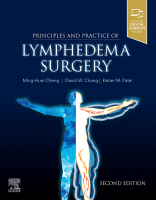 The MSK library recently added the second edition of Principles and Practice of Lymphedema Surgery. This text provides step-by-step guidance on how to incorporate or expand the treatment of lymphedema in one’s practice. Principles and Practice of Lymphedema Surgery provides the latest surgical and nonsurgical approaches, from preoperative assessment to postoperative care. Major topics include the principles of the lymphatic system, diagnostic imaging, lymphedema treatment, and postoperative management.
The MSK library recently added the second edition of Principles and Practice of Lymphedema Surgery. This text provides step-by-step guidance on how to incorporate or expand the treatment of lymphedema in one’s practice. Principles and Practice of Lymphedema Surgery provides the latest surgical and nonsurgical approaches, from preoperative assessment to postoperative care. Major topics include the principles of the lymphatic system, diagnostic imaging, lymphedema treatment, and postoperative management.
Contributors to this text include MSK’s own Dr. Michelle Coriddi, Dr. Joseph H. Dayan, Dr. Raghu P. Kataru, and Dr. Babak J. Mehrara.